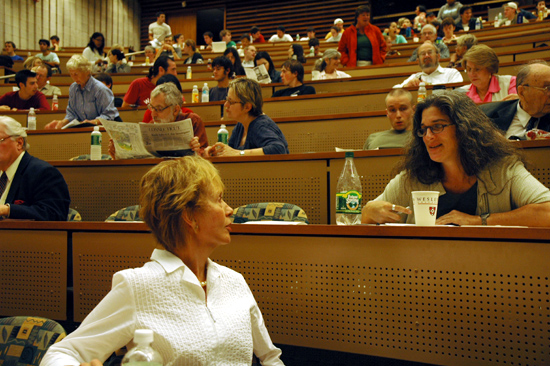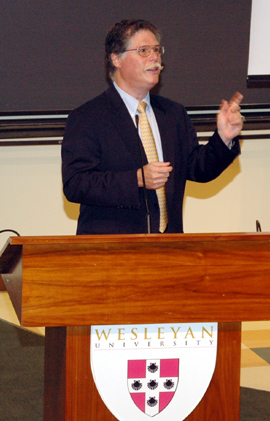World Ecosystems, Energy Policy Discussed at Symposium
 |
| Professor Dianna Wall of Colorado State University speaks with Lori Gruen, associate professor of philosophy and co-chair and associate professor of feminism, gender and sexuality studies during the 2005 Robert Schumann Environmental Studies Symposium held Oct. 8.
Below, Professor Barry Chernoff, the Robert Schumann Professor of Environmental Studies, professor of biology, professor of earth and environmental sciences, and director of the Environmental Studies Certificate program speaks with the symposium’s attendees. Chernoff organized the day-long symposium. |
| Posted 10/18/05 |
 Where on Earth are We Going? II was the topic of the 2005 Robert Schumann Environmental Studies Symposium held Oct. 8. in Exley Science Center. More than 100 people from across the country attended the event. Where on Earth are We Going? II was the topic of the 2005 Robert Schumann Environmental Studies Symposium held Oct. 8. in Exley Science Center. More than 100 people from across the country attended the event.
The discussion explored issues on global warming and climate change; world ecosystems in peril; energy policy; regional initiatives; ethics, environmental issues and the poor; and earth charter principles. Panelists included Lori Gruen, associate professor of philosophy and co-chair and associate professor of feminism, gender and sexuality studies; Gary Yohe, the John E. Andrus Professor of Economics; James Hansen of NASA; Richard Morgenstern of Resources for the Future; Roger Smith ’01, coordinator of the Connecticut Climate Coalition; Diana Wall of Colorado State University; and Timothy Weiskel of the W.E.B. Du Bois Institute. William Blakemore of ABC News was symposiums moderator. The event was organized by Barry Chernoff, the Robert Schumann Professor of Environmental Studies, professor of biology, professor of earth and environmental sciences, and director of the Environmental Studies Certificate program. Gruen, one of the featured presenters, spoke on Ethical Issues: Environmental Justice and the Poor. In her presentation, Gruen explained that the poor are disproportionately burdened by environmental problems such as extreme climate events, exposure to toxics in our environments and the wider context of global warming. She used Hurricane Katrina as an example. Aiding those who are exposed to toxics or those who suffered worse from the recent hurricanes along the Gulf Coast is a matter of justice, not charity, given the systemic structure of racism and injustice in the U.S., she said. Ignoring the unequal position that individuals and/or communities and/or nations are situated in will hinder cooperative environmental protection efforts. Where on Earth are We Going? was held Sept. 11, 2004. Highlights of that event included identifying the smoking gun of global warming in Artic climate changes, exploration of options for environmentally benign sources of energy, and human values, attitudes and behavior that influence the future of humanity. |
| By Olivia Drake, The Wesleyan Connection editor |

